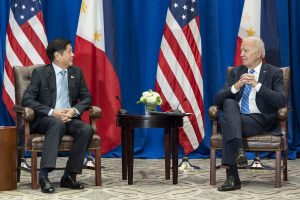The United States has repeated its warning that it is treaty-bound to defend the Philippines in case of an armed attack in the South China Sea, after Chinese ships blocked and collided with two Filipino vessels close to a contested shoal.
In the early hours of Sunday morning, a China Coast Guard vessel collided with a Philippine Navy-contracted civilian transport ship resupplying Philippine personnel stationed at Second Thomas Shoal in the Spratly Islands. Shortly afterward, a Chinese maritime militia ship and a Philippine Coast Guard (PCG) vessel bumped into each other.
The incident was just the latest in the vicinity of Second Thomas Shoal, as Chinese coast guard and maritime militia vessels have escalated their attempts to prevent the Philippines from resupplying the troops stationed aboard the BRP Sierra Madre, a World War II-era ship that was purposefully grounded on the shoal in 1999. Philippine officials say that no one was injured in the collisions, but that they had damaged both the PCG ship and the small wooden-hulled supply boat.
In the wake of the incident, which Defense Secretary Gilberto Teodoro denounced as an act of “brute force” and a “blatant violation of international law,” Washington renewed its warnings, made consistently over the past four years, that it has an obligation to defend the Philippines if Philippine forces, ships, or aircraft come under an armed attack, including “those of its coast guard – anywhere in the South China Sea.”
“The United States stands with our Philippine allies in the face of the People’s Republic of China coast guard and maritime militia’s dangerous and unlawful actions obstructing an October 22 Philippine resupply mission to Second Thomas Shoal,” the U.S. State Department said in a statement yesterday.
According to the 1951 Mutual Defense Treaty between the Philippines and the U.S., each of the two nations “recognizes that an armed attack in the Pacific Area on either of the Parties would be dangerous to its own peace and safety and declares that it would act to meet the common dangers in accordance with its constitutional processes.”
For some time, however, there was ambiguity about whether this security guarantee applied to the Philippines’ features in the South China Sea, which were only formally incorporated by Manila in 1978.
The issue was clarified in March 2019, when then U.S. Secretary of State Mike Pompeo visited Manila and explicitly stated that the guarantee applied to Philippine forces in the South China Sea. The U.S. has continued to affirm this commitment under President Joe Biden.
So far, China has engaged in so-called “gray zone” operations that fall short of the threshold of war, and would avoid triggering either a Philippine military response or the U.S. security guarantee.
However, the recent pattern of incidents culminating in Sunday’s collisions has walked a dangerous line. Even if a collision between coast guard vessels would not itself force a U.S. involvement, there is the possibility of further miscalculations that result in a wider conflict.
Aside from any risks of conflict, the incident is likely to precipitate a chilling of bilateral relations, which have historically been quarantined from the outstanding maritime and territorial disputes.
Philippine diplomats summoned a Chinese Embassy official in Manila yesterday to deliver a strongly worded protest following the collisions, and President Ferdinand Marcos Jr. called an emergency meeting with the defense secretary and other top military and security officials to discuss the latest frictions in the South China Sea.
At the meeting, Marcos “instructed the Philippine Coast Guard to conduct an investigation, as mandated by international maritime laws, into the events that transpired during the mission to Ayungin Shoal,” the presidential press office said in a statement.
“The incident, brought about by dangerous, illegal, and reckless maneuvers by vessels of the China Coast Guard, caused damage to a Philippine vessel within our exclusive economic zone and is being taken seriously at the highest level of government.”
Beijing accused the Philippines of provoking the collisions, claiming the Philippine vessels intruded into “Chinese” territory.
“China once again urges the Philippines to take seriously China’s grave concerns, honor its promise, stop making provocations at sea, stop making dangerous moves, stop groundlessly attacking and slandering China, and to tow away the illegally ‘grounded’ warship as soon as possible,” Chinese Embassy official Zhou Zhiyong said in a statement.

































